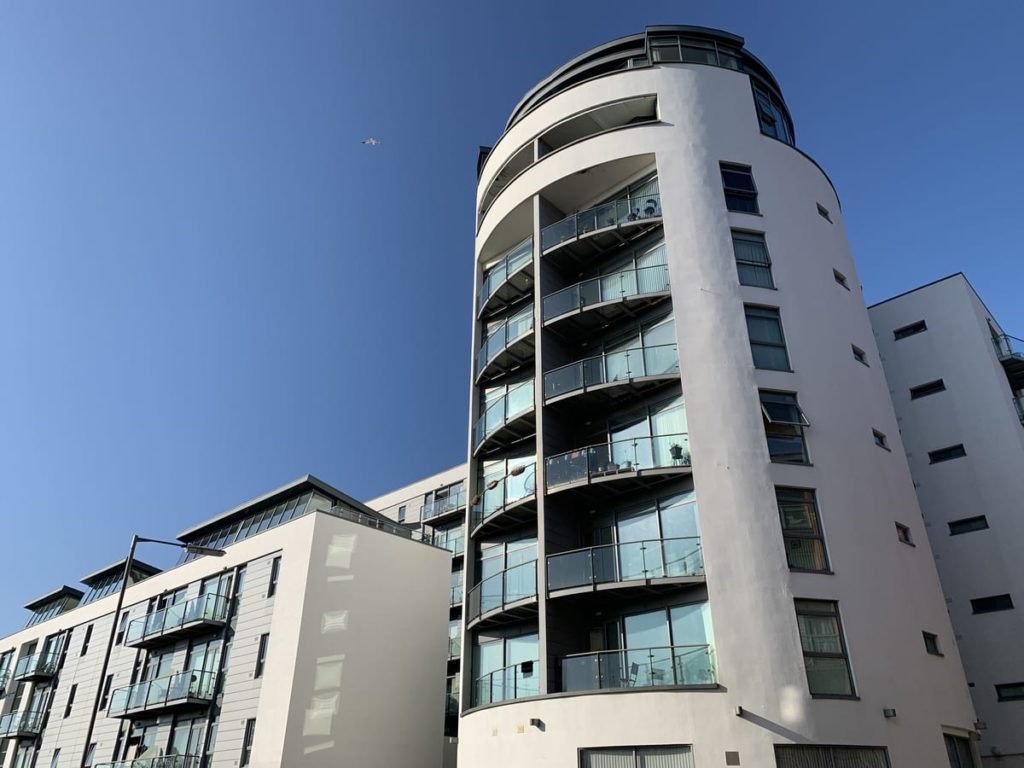
Leaseholders at the Circle 109 development in central Liverpool were told at the weekend that round-the-clock fire surveillance, by trained professionals, could not continue under current circumstances.
“The mortality risk of the virus is currently higher than the risk of a fire,” said managing agent Centrick in a letter seen by LKP.
Instead, leaseholders and renters at the scheme are being urged to undertake the 24/7 patrol duties themselves:
“On the basis of this high risk we are stopping the waking watch and we would like the occupants to take over the role. We are therefore writing to all Leaseholders and tenants to ask whether you would be willing to undertake the patrol in shifts …”
According to the letter, leaseholders at Circle 109 already pay £3,284.40 per week for the “waking watch” contract.
The managing agent claimed that the new set-up would start as a pilot scheme “to ensure we are delivering the requirements of the watch.”
While a small number of cladding victims across the country have donned the hi-vis jackets to keep their homes safe, such as leaseholders at the 57-flat Northpoint in Bromley, south east London, they made the decision to do so amongst themselves, motivated by a desire to reduce reliance on external providers so leaseholders could bear down on spiralling service charges.
Circle 109 in Liverpool, however, is the first case where a landlord-appointed managing agent has pulled waking watch coverage and initiated a resident-led alternative interim fire protection arrangement.
Leaseholders there are being told they would be given “an air horn for assistance” and that they should “spot check the fire panel for any faults”.
In the event of an emergency, the untrained residents would be required to “sound the communal fire alarm” and contact local fire services.
The shock proposal demonstrates how the Covid-19 lockdown and social distancing measures are presenting new challenges for leaseholders in dangerously-clad apartment buildings.
Managing agent Centrick has since quit, according to a report today in the Liverpool Echo.
People in ‘dangerous cladding’ flat block asked to do fire checks
People in a seven-storey apartment block covered in ‘dangerous cladding’ were asked to carry out “waking watch” patrols to guard against fire in a move branded as “shocking” by those living there. The idea was proposed by property bosses Centrick, on behalf of the freeholder, who were responsible for The Circle flats on Henry Street in Liverpool city centre.
Kerrington Property is said to be taking over day-to-day management responsibilities to ensure the cladding site’s future is not thrown into disarray completely.
It is unclear whether this latest development means residents will still be expected to become watchmen for the 109-flat block.
While long-term impacts of the coronavirus emergency on leasehold remain unknown, it appears government has been innovating at speed to help leaseholders who may be facing fresh job uncertainty.
For example, already under pressure to strengthen renters’ security of tenure amid the public health crisis with calls to suspend no-fault evictions, government pressed pause on forfeiture last month to give leaseholders respite:
On Thursday, Communities Secretary Robert Jenrick wrote to MPs to confirm that the prospectus for the recently-announced £1bn Building Safety Fund will be published next month, with the application system for cladding removal money going live soon after.
In comments to the BBC, Mr Jenrick said that “keeping buildings safe” is “absolutely essential to all of us” which, he added, showed that “there is work that will need to continue, if it is safe to do so, through this crisis.”
Two weeks ago, the National Fire Chiefs Council (NFCC) issued new guidance to landlords, managing agents and contactors to say that waking watch fire wardens now have a greater role to play given residents are staying in multi-occupancy buildings for longer periods, increasing fire risks.
The body representing all of the country’s fire services suggested that landlords and managing agents may consider installing new fire alarm systems should waking watch coverage be materially affected by coronavirus challenges.
LKP had criticised the intervention, with chair Martin Boyd saying owners of cladding sites who have failed to install fire systems are highly unlikely to be persuaded to do so during a pandemic.
NFCC head Roy Wilsher, the respected veteran firefighter, has already signalled frustration at the challenges of dealing with the anonymous speculators in freeholds, often based offshore, to ensure residents of high-rise buildings across England and Wales are kept safe.





 Jenrick: ‘We owe it to Grenfell community to get building safety right’
Jenrick: ‘We owe it to Grenfell community to get building safety right’





















